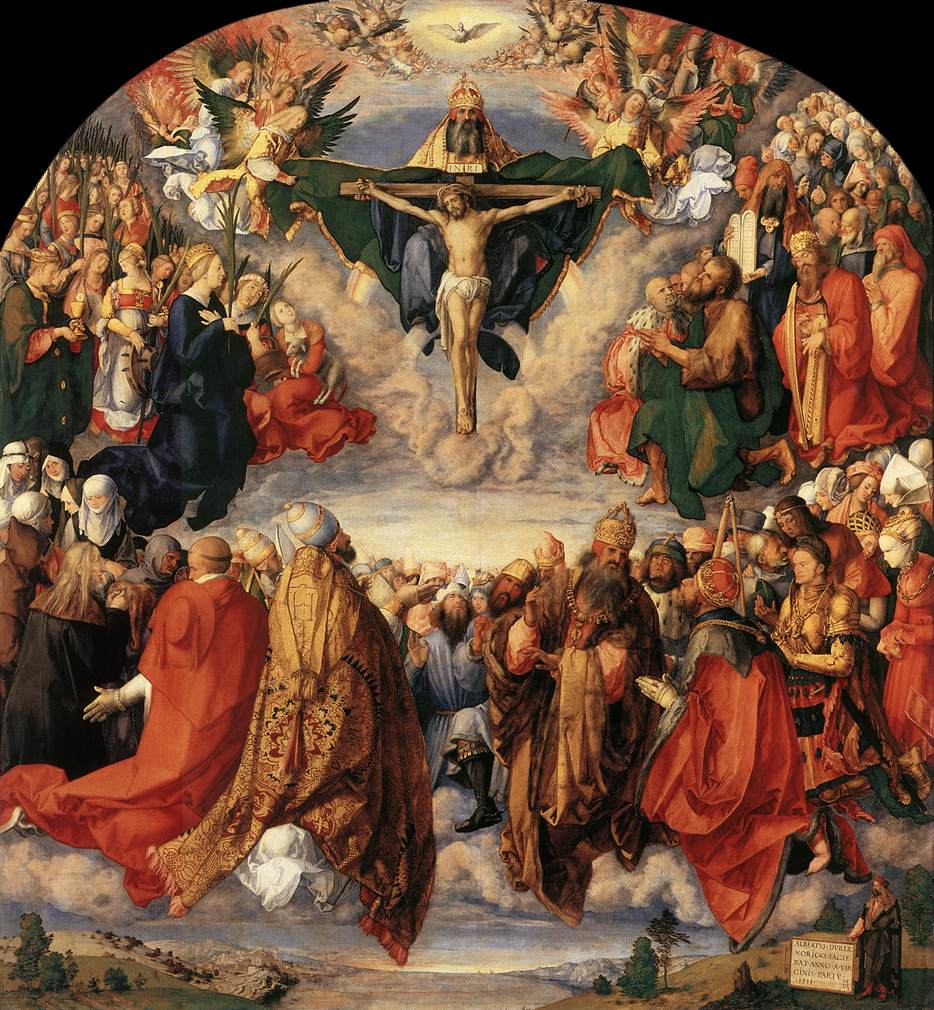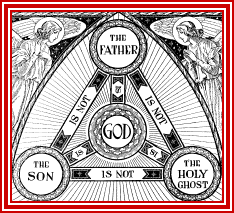Ave Maria!
Trinity Sunday - 3 June AD 2012
Albrecht Durer—Adoration of the Trinity (1511)“All powerful, eternal God, Thou hast given Thy Children the true Faith: they adore Thee in the glory of Thy Trinity, and in the grandeur of Thy Unity; may the firmness of this belief strengthen us in the face of life’s difficulties”[1]
I had dinner with a friend after the first Friday Mass, and our conversation turned first to how stained glass windows are made, and then to a discussion about the various high technology materials that are now available—things like polymers, resins, vacuum deposited metals, and semiconductors. And, the, of course, we talked about some of the things made with these materials—things that were “science fiction” just fifty or seventy-five years ago.
I was very pleased when my friend exclaimed how generous God was that he gave us both the material bounty of the earth, and the intellectual ability to learn how to make use of those materials. I was pleased because all too many people today are tempted to conclude that the progress of modern technology demonstrates man’s independence from God—they fail to appreciate that both the material world, and our ability to understand it and manipulate it, are gifts from God. Had God not willed to create the physical universe, and willed to create it in the way He did, there would have been no materials, and no man to worry about using them.
“Thou hast given Thy Children the true Faith!”
On this feast of Trinity Sunday it is opportune to mention that these same gifts of human understanding bring us part of the way to knowing God Himself. Our physics, chemistry, and other technologies all come from man’s ability to observe the world around him, to generalize his findings, and to draw conclusions from what he sees. In the same way, he is able to observe God’s work in the universe, and to conclude God’s existence from the evidence God leaves behind.
Saint Thomas Aquinas lists five ways in which we can know the existence of God through observation. God is (1)the necessary First Mover, for all motion requires a mover; (2) the necessary first cause, for there are no effects without cause; (3) the only necessary being, for all other beings come into existence and then cease to be after a time; (4) the perfect being, against which the good of other things can be compared; and finally (5) the Author of order and design in the universe, neither of which occur through random chance.[2]
But Saint Thomas, like all realistic theologians, knew that there was a limit to man’s knowledge of God through these methods of unaided reason. There are higher truths than God’s mere existence that are unknowable through human observation, for God is transcendent—that is to say that He exists on a level above us where we have no means to make observations. We call these things “mysteries” and we know them only because God has chosen to make them known to us.
The mysteries are no less real than the truths we gain from observation—although our ability to understand them might be a bit weaker—indeed, we might say that they are “more real” for they deal with the knowledge of God in Himself, the ground of all existence, truth, and reality. In the mysteries God raises man up to Himself, making man much more than he is in his natural state.
“Thou hast given Thy Children the true Faith!”
Mysteries, like the knowledge that the One God exists in a Trinity of Persons, are a precious gift, given by the Creator to His creatures over the centuries. The Old Testament Jews knew of God’s existence because He revealed Himself to them—a sort of first mystery, over and above what they knew through their natural reason. There were even a few hints of God’s existence in Trinity that we might recognize with our hindsight: In Genesis, we read that “the Spirit of God moved over the waters.”[3] Isaias describes the threefold salutation of the Seraphim before the throne of God: “Holy, Holy, Holy.”[4], and elsewhere lists “wisdom, understanding, counsel, strength, knowledge, and fear of the Lord,” that we associate with the Holy Ghost.[5] Isaias even prophesied that “the virgin shall be with child, and bear a son, and shall name him Emmanuel” (translated: “God is with us”).[6]
But the real revelations of God in Trinity are found in the New Testament. “Hail Mary, full of grace … the Holy Ghost shall come upon thee and the power of the Most High shall overshadow thee, and the Holy to be born shall be called the Son of God.”[7] At the Baptism of Jesus we read “that heaven was opened, and the Holy Ghost descended upon Him in bodily form as a dove, and a voice came from heaven, ‘Thou art My beloved Son, in Whom I am well pleased.’”[8] A number of times Jesus identifies Himself with His Father in heaven.[9] Jesus spoke of sending the Apostles a new “Advocate, the Spirit of Truth,”[10] “the Holy Ghost with Whom they would be baptized.”[11] Perhaps our Lord was the most explicit in today’s Gospel, when He told the Apostles to baptize “in the name of the Father, and of the Son, and of the Holy Ghost.”[12]
“Thou hast given Thy Children the true Faith!”
I would be more than mildly surprised to learn that modern Catholics are still using this collect for Trinity Sunday. I had not Internet access when I wrote this, but my limited library suggests they are not.[13] Indeed, speaking of the “true Faith” is probably too “politically incorrect” for any modern Christian denomination.
An incredible story broke last week about liberal Protestants in Turkey issuing a Bible with carefully phrased names for the three Divine Persons, so as not to “offend” Moslem readers. Jesus is sometimes styled the “Representative of God,” the Father is sometimes the “Protector,” and sometimes the “Auxiliary.” The command to baptize becomes “purify them with water in the name of Allah, of His Messiah, and His Holy Spirit.” Baptism is the “ablution of repentance.”[14]
“Thou hast given Thy Children the true Faith”???
Thankfully, we are not talking about Catholics here (not this time—so far Modernist “Catholics” have not gone beyond kissing, blessing, and reading the Koran at Mass![15]), and thankfully, there is strong opposition from conservative Protestants. But this is precisely what happens when any brand of Modernism runs amuck. The knowledge of the Trinity is an intimate revelation of God Himself to His people—it is one of the most precious gifts of the True Faith—it never should be hidden or disguised. But really, this is so for any divine truth—whether it is known through natural reason or through divine revelation. Truth must never be traded off for popularity with those who lack the True Faith, not disguised to avoid offending the ignorant.
While only God can judge the subjective dispositions of men’s hearts, there is an objective requirement for Baptism, belief in God’s revelation, and membership in the one Church which He founded. Other religions may have some of the truths of the Faith, but all are lacking in some essentials, making them, objectively, roads to perdition. There is always room for cordiality and for civic cooperation, but the encouragement of (or cooperation in) false worship, morality, or teaching is gravely sinful.
There can be no “dialogue” between error and God’s Truth. Those of the True Faith have a positive obligation to oppose all who would destroy, diminish, or even dilute the truths given us by Almighty God—lest in betraying these Truths we should lower ourselves from Him who has raised us up to a knowledge of Himself.
“Thou hast given Thy Children the true Faith: they adore Thee in the glory of Thy Trinity, and in the grandeur of Thy Unity; may the firmness of this belief strengthen us in the face of life’s difficulties.”
Notes:
[1] Traditional collect of Trinity Sunday
[2] cf Summa Theologica, Ia, Q2, a3. http://www.newadvent.org/summa/1002.htm#article3
[3] Genesis i: 2 http://www.drbo.org/x/d?b=drb&bk=1&ch=1&l=2#x
[4] Isaias vi:1-3 http://www.drbo.org/x/d?b=drb&bk=27&ch=6&l=1#x
[5] Isaias xi: 1-2 http://www.drbo.org/x/d?b=drb&bk=27&ch=11&l=1#x
[6] Isaias vii: 14 http://www.drbo.org/x/d?b=drb&bk=27&ch=7&l=14#x
[8] Luke iii: 21-22 http://www.drbo.org/x/d?b=drb&bk=49&ch=3&l=21#x
[9] e.g. John vi:58, http://www.drbo.org/x/d?b=drb&bk=50&ch=6&l=58#x
John xiv:6 http://www.drbo.org/x/d?b=drb&bk=50&ch=14&l=6#x[10] John xvi:5-14 http://www.drbo.org/x/d?b=drb&bk=50&ch=16&l=5#x
[12] Matthew xxviii: 19 http://www.drbo.org/x/d?b=drb&bk=47&ch=28&l=19#x
[13] Gregorian Missal, Solesmes: 1990 page 405.
Indeed, they do not—see http://www.churchyear.net/trinityprayers.html

